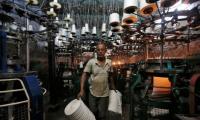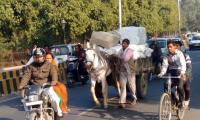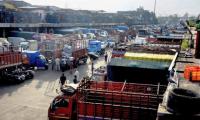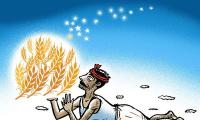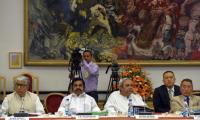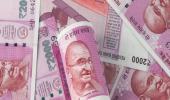Farmers Protest in Poland & Spain: Ukraine Imports, EU Policies
Farmers in Poland and Spain protest against Ukrainian food imports and EU agricultural policies, raising concerns about the impact on their livelihoods and the potential for pro-Russian influence.
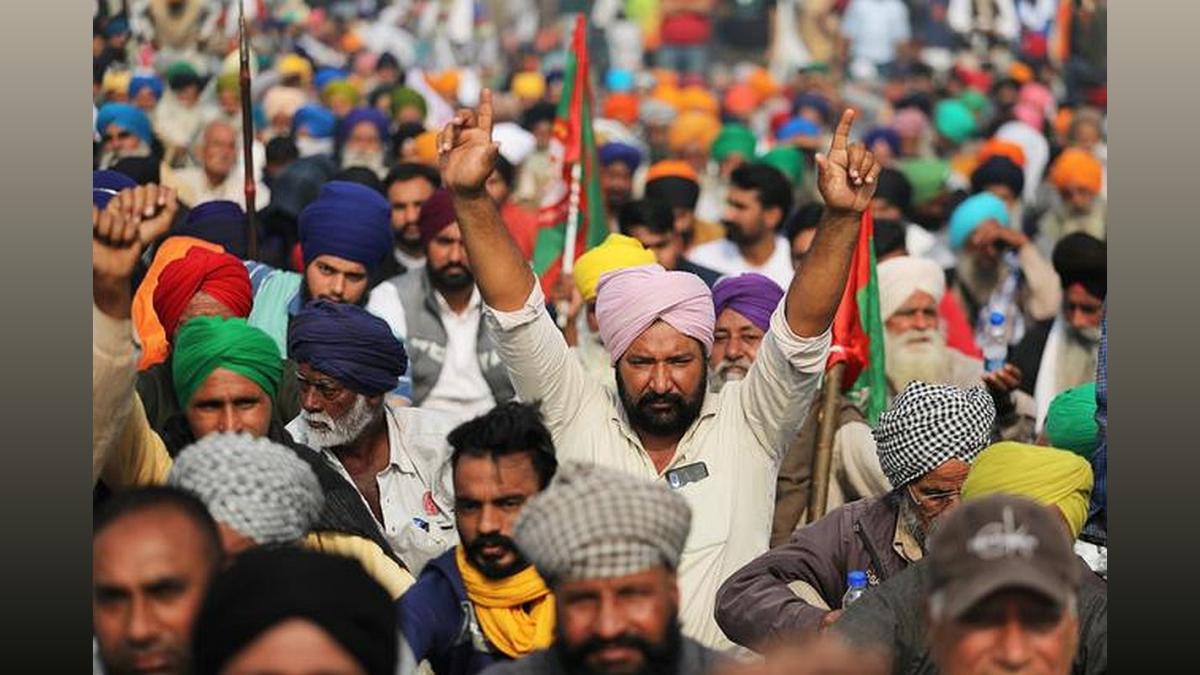
Warsaw, Feb 27 (AP) Thousands of farmers marched in Poland's capital and Spanish farmers cut off traffic on highways near the French border on Tuesday in the latest protests against food imports from Ukraine and the European Union's agricultural policies.
The actions follow similar protests across Europe in recent weeks, and come as the West is experience growing fatigue in helping Ukrainians as they try to push back Russia's invasion.
Farmers and their supporters blew horns and burned smoke bombs in the white-and-red colours of the national flag in front of the Polish parliament in Warsaw before marching to the offices of Prime Minister Donald Tusk. Warsaw city hall estimated that 10,000 people took part.
Protesters want a withdrawal from the EU's Green Deal, a plan meant to fight climate change and help the environment with measures that they say are too costly.
The protesters are also demanding a ban on the imports of Ukrainian grain and other produce and allege that poorer quality Ukrainian produce is harming the country's food supply and putting its important agricultural sector in jeopardy. They are angry at the EU for lifting tariffs on Ukrainian food imports while Ukraine a major food producer sought ways get its food to global markets with war hampering transport in the Black Sea.
The swell of protests across the 27-member EU have become a major challenge for leaders, most of whom strongly support Ukraine but are forced to respond to the rising social anger.
We want to help Ukraine," Tusk said in Prague, where he travelled for a meeting of regional leaders on Tuesday. But it cannot be done through actions that are lethal to whole areas of the economy.
Nobody has the right to believe that the Czech Republic or Poland do not support Ukraine, he said, appearing alongside Czech Prime Minister Petr Fiala.
But at the same time, we soberly assess the negative impact of the decision on free trade with Ukraine, which has a negative impact on our economies. And we will work together in Brussels to make corrections that will protect the common European market against the negative effects of such a decision.
Tusk also said the EU's Green Deal has praiseworthy climate goals but that some provisions are a burden hard to shoulder, especially for medium-size and small farm producers.
Tusk also noted that EU food producers cannot compete with Ukrainians because "the standards that are required of European and Polish farm producers are very high. There are no procedural requirements, no standards required of Ukrainian foods.
The mood at Warsaw's protest had anti-Ukrainian undertones.
Stop poisoned food from Ukraine in Polish stores, read a sign in front of the Polish parliament, while another said: European policies destroy farmers. No to goods from Ukraine.
Tusk last week insisted that the Polish farmers are by and large not anti-Ukrainian, noting that many of them are the same people who have extended help to Ukrainian refugees. But Polish officials are also worried about the risk of pro-Russian elements infiltrating the farmers movement to stir up anti-Ukrainian feelings.
Among the protesters was an insurance agent, Tomasz Zrodowski, who said he took part to support the farmers. He denounced the EU's Green Deal as an ideology of stupidity.
He also said he feared the Polish agricultural sector will end up as another victim of Russian President Vladmir Putin's war.
We support Ukraine but we can't help Ukraine if we go bankrupt. Food is a weapon for Putin, just like oil and gas," he said.
From Italy to Spain to Belgium and elsewhere, farmers' protests have made their plight a key political theme ahead of June 6-9 parliamentary elections in the EU.
In Spain on Tuesday, farmers cut off traffic on highways in northeast Catalonia, on the border with France. Spanish farmers have been protesting regularly in recent weeks, and several hundred tractors rolled into Madrid last Wednesday in their largest show of force yet.
The EU Commission has already made some concessions to farmers, including postponing a cut in pesticide use until after the elections.
The actions follow similar protests across Europe in recent weeks, and come as the West is experience growing fatigue in helping Ukrainians as they try to push back Russia's invasion.
Farmers and their supporters blew horns and burned smoke bombs in the white-and-red colours of the national flag in front of the Polish parliament in Warsaw before marching to the offices of Prime Minister Donald Tusk. Warsaw city hall estimated that 10,000 people took part.
Protesters want a withdrawal from the EU's Green Deal, a plan meant to fight climate change and help the environment with measures that they say are too costly.
The protesters are also demanding a ban on the imports of Ukrainian grain and other produce and allege that poorer quality Ukrainian produce is harming the country's food supply and putting its important agricultural sector in jeopardy. They are angry at the EU for lifting tariffs on Ukrainian food imports while Ukraine a major food producer sought ways get its food to global markets with war hampering transport in the Black Sea.
The swell of protests across the 27-member EU have become a major challenge for leaders, most of whom strongly support Ukraine but are forced to respond to the rising social anger.
We want to help Ukraine," Tusk said in Prague, where he travelled for a meeting of regional leaders on Tuesday. But it cannot be done through actions that are lethal to whole areas of the economy.
Nobody has the right to believe that the Czech Republic or Poland do not support Ukraine, he said, appearing alongside Czech Prime Minister Petr Fiala.
But at the same time, we soberly assess the negative impact of the decision on free trade with Ukraine, which has a negative impact on our economies. And we will work together in Brussels to make corrections that will protect the common European market against the negative effects of such a decision.
Tusk also said the EU's Green Deal has praiseworthy climate goals but that some provisions are a burden hard to shoulder, especially for medium-size and small farm producers.
Tusk also noted that EU food producers cannot compete with Ukrainians because "the standards that are required of European and Polish farm producers are very high. There are no procedural requirements, no standards required of Ukrainian foods.
The mood at Warsaw's protest had anti-Ukrainian undertones.
Stop poisoned food from Ukraine in Polish stores, read a sign in front of the Polish parliament, while another said: European policies destroy farmers. No to goods from Ukraine.
Tusk last week insisted that the Polish farmers are by and large not anti-Ukrainian, noting that many of them are the same people who have extended help to Ukrainian refugees. But Polish officials are also worried about the risk of pro-Russian elements infiltrating the farmers movement to stir up anti-Ukrainian feelings.
Among the protesters was an insurance agent, Tomasz Zrodowski, who said he took part to support the farmers. He denounced the EU's Green Deal as an ideology of stupidity.
He also said he feared the Polish agricultural sector will end up as another victim of Russian President Vladmir Putin's war.
We support Ukraine but we can't help Ukraine if we go bankrupt. Food is a weapon for Putin, just like oil and gas," he said.
From Italy to Spain to Belgium and elsewhere, farmers' protests have made their plight a key political theme ahead of June 6-9 parliamentary elections in the EU.
In Spain on Tuesday, farmers cut off traffic on highways in northeast Catalonia, on the border with France. Spanish farmers have been protesting regularly in recent weeks, and several hundred tractors rolled into Madrid last Wednesday in their largest show of force yet.
The EU Commission has already made some concessions to farmers, including postponing a cut in pesticide use until after the elections.
You May Like To Read
TODAY'S MOST TRADED COMPANIES
- Company Name
- Price
- Volume
- Welcure-Drugs-and
- 0.47 ( -2.08)
- 16352380
- Vodafone-Idea
- 11.24 ( -1.06)
- 15859834
- Sylph-Technologies
- 1.01 (+ 4.12)
- 10820355
- Meesho-L
- 188.85 (+ 10.60)
- 6668875
- Sunshine-Capital
- 0.27 (+ 3.85)
- 5003717
